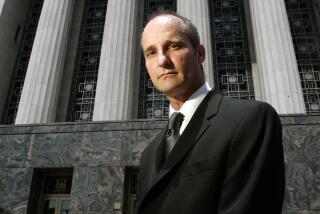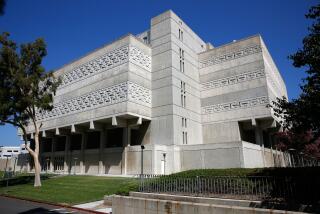Quayle Charges Found to Lack Corroboration : Drugs: The Times probed allegations similar to those in Doonesbury cartoons, could not substantiate them.
- Share via
WASHINGTON — On two separate occasions in the last three years, Times reporters have examined and found no truth to allegations that Vice President Dan Quayle bought drugs as a law student and later as a senator.
The allegations--similar to charges contained in Doonesbury comic strips that are scheduled to run for two weeks, starting Monday--were originally made by convicted drug dealers, and reporters were unable to find any credible corroboration. As a result, the decision was made in both instances not to write a story about the allegations.
The strips by Garry Trudeau have caused a controversy among newspaper editors over whether to publish them. Many said they were trying to investigate the charges before making a decision.
Quayle’s spokesman has issued a categorical denial of the allegations. In an interview Wednesday, David Beckwith, the vice president’s press secretary, denounced the strips as despicable innuendo.
“Both Garry Trudeau and Universal Press Syndicate (the strip’s distributor) know for a moral certainty that the allegations were proven to be false,” Beckwith said. “Yet they are proceeding anyway. I think that is outrageous.”
Lee Salem, editorial director of the syndicate in Kansas City, said that Trudeau based the strips on Washington news reports, including allegations of a convicted felon who said he had sold marijuana to Quayle.
In a statement issued Wednesday, the Drug Enforcement Administration said that agents received information in July, 1982, that Quayle had purchased cocaine and Quaaludes in Indiana. A follow-up investigation by a DEA task force investigating drugs on Capitol Hill determined that the allegations were untrue, according to the statement.
“The investigation of the allegations was handled properly and thoroughly by DEA consistent with established investigative techniques,” the statement said. “Consistent with Department of Justice policy, the investigative file has been kept confidential.”
The first allegation was made just before the 1988 presidential election. An Indiana man serving 50 years in prison for drug smuggling and a series of bombings claimed to have sold marijuana to Quayle in the early 1970s when Quayle was a student at Indiana University Law School. Reporters were unable to find anyone who could support the allegation.
The second accusation was made by a convicted drug dealer who allegedly claimed to have sold cocaine to Quayle in the men’s room of an Indianapolis athletic club in 1982 when Quayle was a U.S. senator. Those allegations proved either untrue or unprovable.
For instance, the person describing the dealer’s charges to The Times refused to provide the name of the dealer. The source acknowledged, however, that the dealer had failed a lie detector test administered for “60 Minutes,” the CBS-TV program.
“This guy not only flunked the lie detector test, but he broke down and cried in front of Morley Safer and said that he had made it up because he wanted to get out of jail,” Don Hewitt, the program’s executive producer, said Wednesday.
The Washington Post reported Wednesday that it also had received allegations similar to those in the Doonesbury strips and found them to be unsubstantiated.
The first allegation was made by Brett Kimberlin. Among the crimes for which Kimberlin is in prison are perjury, marijuana smuggling and setting off a series of bombs in the Indianapolis suburb of Speedway. A man lost his leg in one explosion.
In the fall of 1988, Kimberlin telephoned a Times reporter from prison and claimed to have sold marijuana to Quayle several times in the early 1970s after meeting him at a party. Kimberlin acknowledged that he could not provide witnesses to corroborate his allegation, although he did have a fellow inmate telephone the reporter and say that Kimberlin had told him in 1983 that he had sold marijuana to an unnamed U.S. senator.
Kimberlin provided the names of other individuals who he said knew about Quayle’s drug use. Two of those people were interviewed and denied any knowledge of drug use by Quayle.
In addition, Kimberlin said that he had mentioned the marijuana sale to a friend who was later convicted of drug dealing. Kimberlin said that the friend had recounted the sale to Quayle in court records in his own case. A review of the court file for the dealer found no mention of Quayle, and reporters were unable to find the dealer himself. However, through an associate, the dealer said he had never been told such a story.
Kimberlin described the alleged marijuana sale to Quayle to other journalists, including reporters for National Public Radio and NBC-TV, and Kimberlin was in frequent contact with reporters by telephone from the federal prison in El Reno, Okla.
On Nov. 4, 1988, the Friday before the election, prison officials scheduled a press conference for Kimberlin to accommodate the number of press calls concerning his charges. At the last minute, prison officials canceled the news conference and placed Kimberlin in solitary detention.
Kimberlin was released from detention on Nov. 5 but was placed in detention again on Nov. 7 after prison authorities discovered that he planned to telephone a group of reporters in Washington, according to court records.
Kimberlin has filed a lawsuit in federal court here against the Bureau of Prisons and various officials for violating his First Amendment rights in halting the press conference and placing him in detention, which he says was done to silence him.
The order to cancel the press conference and place Kimberlin in detention was issued by Michael Quinlan, the director of the Bureau of Prisons in Washington, according to documents in the suit. Other documents show that Quayle campaign officials were aware of Kimberlin’s charges and were concerned about the press conference in the closing days of the presidential race.
However, there is no indication in the documents that campaign officials suggested canceling the press conference. A former top Justice Department official told The Times in an interview earlier this year that, although he had spoken with Quinlan about the issue, the prisons director took the action independently.
Early last summer, allegations similar to those in the Doonesbury strip concerning the DEA file were brought to The Times by a free-lance journalist. As part of that inquiry, reporters viewed a part of what appeared to be a DEA file regarding allegations that Quayle had purchased cocaine in 1982.
Such files contain raw, unevaluated data. As one DEA official explained last June, anyone can call in and make a claim against someone and the information will go into a DEA file.
According to the free-lance journalist, the allegation against Quayle had been made to an assistant U.S. attorney in Indianapolis. The prosecutor had then asked an official in the criminal division of the Justice Department in Washington for permission to have an undercover agent attempt to sell cocaine to Quayle. The journalist did not provide the name of the assistant U.S. attorney but said that he was still in government and would not talk about the matter.
In an interview, the criminal division official, who is now in private practice, showed a Times reporter a journal in which he had noted a call on Sept. 22, 1982, from an assistant U.S. attorney in Indianapolis who wanted to try to sell drugs to Quayle. The former official said that he relayed the request “upstairs” because he regarded it as too sensitive to handle himself.
Such an operation would have been a departure from department practice at the time because it would have involved selling drugs to make an arrest. Normal procedure was to buy drugs and arrest the seller.
All four present or former Justice Department officials who logically would have handled such a request were interviewed by a reporter and said that they had no recollection of any such request involving Quayle.
Reporters attempted also to find DEA clerks who were allegedly disciplined for having read the Quayle file while “window shopping” through files in the agency’s computer. The Times was unable to find anyone who had been disciplined or knew of anyone who had.
The free-lance journalist said that Quayle’s name had surfaced in a federal inquiry into drug use on Capitol Hill in the early 1980s. One of the agents involved in that investigation said in an interview that the charges were similar to the Indianapolis allegations and that they were found not to be true.
Last summer, The Times was unable to obtain the name of the drug dealer whose claim to have sold cocaine to Quayle apparently generated the DEA file. The free-lance journalist acknowledged at the time that the dealer had failed a lie detector test administered for “60 Minutes.”
In a telephone interview on Wednesday, Kimberlin maintained again that he had sold marijuana to Quayle. He said he had planned to air allegations about the DEA file at his 1988 press conference, but he said he had no idea whether the cocaine charge was true. He claims his only motivation has been to “get the truth out.”
Under the most lenient terms, Kimberlin could have been paroled from prison nearly five years ago with permission from the parole board. However, he has been denied early parole and is not scheduled for release under normal regulations until 1994.
More to Read
Get the L.A. Times Politics newsletter
Deeply reported insights into legislation, politics and policy from Sacramento, Washington and beyond. In your inbox twice per week.
You may occasionally receive promotional content from the Los Angeles Times.










